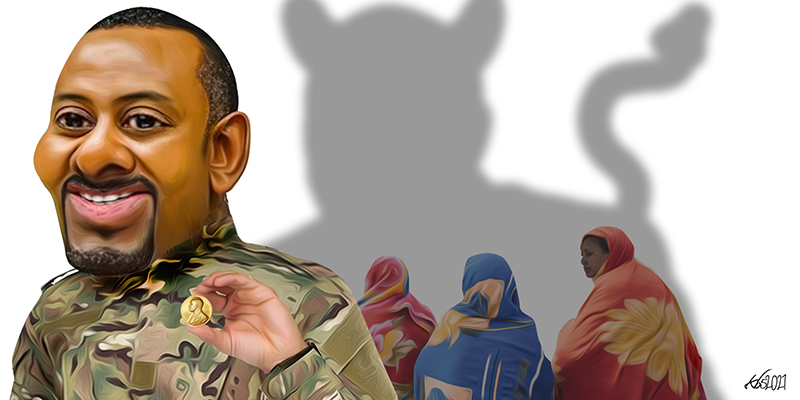Ethiopia will go to the polls on June 22, buffeted by various crises domestically and abroad. But the upcoming election has many echoes of the May 15 2005 election, whose impact continues to shape Ethiopia’s domestic politics and politics in the Horn of Africa. Central to Ethiopia’s current domestic crisis and the border dispute with Sudan, is the Abiy-Amhara compact.
The 15 May 2005 elections were the third national elections to be held under the 1994 constitution following the ouster of the Marxist-Leninist Derg. In the 1995 and 2000 elections, the Ethiopian People’s Revolutionary Democratic Front (EPRDF) government harassed the opposition parties, forcing the influential ones to boycott the polls, with the result that the EPRDF won both elections with over 90 per cent of the seats.
Ahead of the 2005 election, the EPDRF signalled the significant participation of the opposition parties so that Western observers—whose support was critical for Meles—would declare the elections to have been free and fair. The incumbent party acceded to the pre-election demands of some opposition parties, allowing in international election observers and giving the opposition parties a chance to sell their manifestos on the national broadcaster. These conditions were absent in the previous elections. While these were not among the chief demands of the opposition parties prior to the polls, they indicated reasonable good faith on the part of the government compared to previous elections.
As a result, for the first time in Ethiopia’s history, a nationwide multiparty competition seemed possible; neither the ruling party nor the opposition had ever faced a competitive election before.
Internal turmoil within the EPRDF preceded the election. The Central Committee of the Tigray People’s Liberation Front (TPLF)—Prime Minister Meles Zenawi’s core support base—broke up into two rival factions in 2001. With his base in the Tigray heartland at risk, Meles took advantage of his central position within the broader EPRDF coalition and outmanoeuvred his rivals. He sacked several senior officials and successfully weathered the storm, but the fault line remained and emerged during the 2005 elections.
Post-election
The pre-election period saw the unprecedented participation of the opposition parties and civil society organisations in the campaigns. Election Day went peacefully, and the early results in Addis Ababa and other major urban areas showed the opposition parties making significant electoral gains. According to unofficial preliminary results, the opposition had won 172 parliamentary seats—its most considerable showing yet in the 547-member assembly. On the night of the election, Prime Minister Meles Zenawi declared a one-month ban on public demonstrations in the capital and brought the Addis Ababa security forces (which would have come under the opposition’s command had they been sworn in) under the control of the Prime Minister’s office.
Opposition parties boycotted their seats in parliament, alleging rigging by the incumbent. Their refusal to take up their seats in parliament handed Meles Zenawi and his party a third term in office. Meles interpreted his “mandate” as a licence to take the authoritarian path. Hundreds, if not thousands, of political opposition and human rights activists were arbitrarily detained, with some facing the spurious charge of treason. Ethiopian security forces killed almost 200 demonstrators in post-election protests in June and November 2005 and arrested tens of thousands of people.
With the domestic front “sorted”, Meles turned to regional matters. In December 2006, Ethiopia’s military intervened in Somalia to root out the Union of Islamic Courts (UIC), which had brought stability for the few months they were in charge. The Ethiopian forces captured Mogadishu in less than a week, and the UIC dissolved and surrendered political leadership to clan leaders.
Ethiopia’s ouster of the UIC tapped into a deep historical hostility between Somalia and Ethiopia, something Al Shabaab, the youth wing of the UIC, exploited with a mix of latent Somalia nationalism and anti-imperialism.
Ethiopia’s actions provided Al Shabaab with an opportunity to translate its rhetoric into action. Al Shabaab began targeting the nascent Somalia government, Ethiopian forces, the Transitional Federal Government security, political figures, and any Somalis collaborating with Ethiopia. Ethiopia’s and TFG’s heavy-handed counterinsurgency responses played into the hands of Al Shabaab.
Ethiopia’s incursion into Somalia took place three weeks after General John Abizaid, the commander of US forces from the Middle East to Afghanistan, had met with then Ethiopian Prime Minister Meles Zenawi.
Sixteen years later, Ethiopia goes into another election whose consequences could transcend Ethiopia.
The limits of Abiy-Mania
When he ascended to power in April 2018, Prime Minister Abiy Ahmed elicited a groundswell of collective goodwill inside and outside Ethiopia. He embarked at breakneck speed on reforms that just a few years earlier would have sounded far-fetched.
At home, Abiy released political prisoners, appointed the country’s first female as the ceremonial president and a cabinet half-filled by women. He nominated a once-jailed opposition leader as the new chairwoman of the electoral board. In the Horn of Africa region, Abiy had a rapprochement with Eritrea, a country with which Ethiopia had fought a bloody war between 1998 and 2000. Abiy also attempted to mediate the Sudan political crisis.
The Nobel Committee awarded Abiy the 2019 Nobel Peace Prize “For his efforts to achieve peace and international cooperation, particularly for his decisive initiative to resolve the border conflict with neighbouring Eritrea.”
Federalism vs centralisation
While the trigger for the Abiy-led military operation against the Regional Government of Tigray in the north of the country is the alleged attack of the federal army base by the Tigray Peoples Liberation Front (TPLF), the attack was only a symptom and not the actual cause.
The battle between Abiy and the TPLF and other groups is a battle between those who champion the multi-ethnic federalism constitution and those who prefer a centralised state. Abiy favours centralisation to federalism.
The Tigray region is not the first to bear the brunt of the military and federal security forces to achieve Abiy’s centralisation agenda. The Oromia and Sidama regions have also been at the receiving end of the violence of the federal security authorities.
Abiy embarked at breakneck speed on reforms that just a few years earlier would have sounded far-fetched.
Throughout its long history of state formation, Ethiopia was for thousands of years ruled by emperors under a monarchy with a unitary system of government. The last emperor, Haile Selassie, was deposed in 1974 and from then on until 1991, the country came under a dictatorship with a unitary system of government.
The creation of the EPRDF in 1989—an ethnic coalition of the Tigrayan Peoples’ Liberation Front, the Amhara National Democratic Movement (ANDM; later Amhara Democratic Party), the Oromo Peoples’ Democratic Organization (OPDO; later Oromo Democratic Party), and the Southern Ethiopian Peoples’ Democratic Movement (SEPDM)—had changed that.
Abiy’s shot across the bow was the dissolution of the EPDRF and the launching of the Prosperity Party (PP) on December 1 2019. The OPDO, ANDM, and SEPDM voted overwhelmingly to join the party, while the TPLF rejected the idea as “illegal and reactionary”. The timing of the move was convenient, coming just a few months before the election that was postponed because of the COVID-19 pandemic.
The EPDRF’s multi-ethnic federalism and the inclusion in the constitution of the right to secede for all “nations and nationalities and peoples” of the country were innovative breakthroughs in a country with 80 different ethnic groups. But the constitution was also a product of ideological foment and political necessity. The leaders who revolted against the Mengistu junta had emerged from the student movement that had adopted the “nationalities and the land question”, redefining Ethiopian statehood.
The Oromia and Sidama regions have also been at the receiving end of the violence of the federal security authorities.
While the multi-ethnic federalism has been imperfect, especially its implementation and the domination of the EPDRF by the TPLF, in a multi-ethnic country with historical and contemporary grievances against the state, federalism has acted as a safety valve against ethnic tension.
Abiy and Amhara expansionism
The Amharas are Abiy’s vociferous supporters at home. They, especially their elites, have an axe to grind with the TPLF for diluting their decades of uninterrupted state power and control. Amhara language and culture are the state’s language and culture, and the language and culture of the Orthodox Church which wields unfettered power. But with its political nous, its deep bureaucracy and know-how, the TPLF was always a challenging prospect for Abiy, a political novice with limited federal-level experience and hardly a political base. The connecting tissue of Abiy-Amhara unity is the lowest common denominator that is the fear and loathing of the TPLF. After dissolving the EPDR, a coalition in which the TPLF was a strong partner, the next step was to defeat the TPLF militarily. Even before the November military incursion into Tigray, Amhara militias were massed at the border with Tigray. If Abiy’s anti-TPLF move was intended to destroy them as a political force, for the Amharas this was an opportunity to regain some of the territories they had lost to Tigray in 1991.
Sudan
Ethiopia also has a boundary dispute with Sudan. The dispute centres on the al-Fashaga region, Sudan’s fertile breadbasket located in Gedaref State, which borders Ethiopia’s Amhara region in the north-west. According to the Anglo-Ethiopian Treaty of 1902 the area belongs to Sudan and, unlike the regime of Omar al-Bashir, for the transitional government of Prime Minister Abdulla Hamdok, settling this dispute is a priority. However, the Abiy-Amhara alliance has made resolving the dispute complicated.
Sudan is also a critical factor in resolving the Tigray crisis; the country is the only remaining supply route for the TPLF as Eritrea is closed to them and bringing in supplies and fuel through other routes is risky. Sudan could also determine how the GERD dam conflict will be resolved. Unlike Egypt, Sudan could benefit from cheap electricity if the dam is filled, but the country will not countenance losing al-Fashaga. Abiy faces difficult choices: cede al-Fashaga to Sudan and gain a partner in the dam negotiations while also denying the TPLF a supply route or keep al-Fashaga and lose Sudan in the GERD dam discussions, leaving the TPLF to use the Sudan border for supplies.
The Tigray conflict, which Abiy initially promised would be a straightforward law enforcement operation, has instead metastasised into a slow-grinding counterinsurgency operation. The continuing humanitarian crisis in the Tigray region is losing Abiy friends.
On May 23, the US State Department announced visa restrictions for any current or former Ethiopian or Eritrean government officials, members of the security forces, or other individuals—including Amhara regional and irregular forces and members of the Tigray People’s Liberation Front (TPLF)—responsible for, or complicit in, undermining the resolution of the crisis in Tigray.
In a multi-ethnic country with historical and contemporary grievances against the state, federalism has acted as a safety valve against ethnic tension.
America’s sanctions came on the heels of the European Union’s suspension of budgetary support worth €88 million (US$107 million) until humanitarian agencies are granted access to people in need of aid in the northern Tigray region.
On the 7th of June 2021, Representatives Gregory Meeks (D-NY) and Michael McCaul (R-TX), who is also Chairman and Ranking Member of the House Foreign Affairs Committee, together with Karen Bass (D-CA) and Christopher H. Smith (R-NJ), respectively Chairwoman and Ranking Member of the House Foreign Affairs Subcommittee on Africa, Global Health and Global Human Rights, issued a joint statement after tabling a resolution condemning violence and human rights abuses in Ethiopia.
The sanctions come as Ethiopia awards its first telecom licence for US$850 million to a consortium that includes the UK’s Vodafone in what could herald the opening up of Ethiopia’s closed economy.
Before the EPDRF came into power, Ethiopia was a posterchild of famine and incessant conflict, especially under the Derg regime. Abiy and Amhara nationalism is bringing back the echoes of the Derg era and the upcoming June election is unlikely to resolve current crises; if anything, it will exacerbate them.








